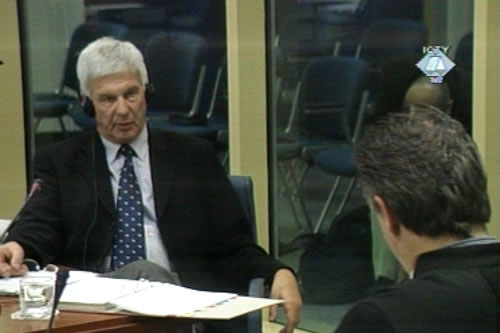Home
WRITTEN ORDERS ARE NOT ENOUGH
Enver Hadzihasanovic and Amir Kubura issued written orders condemning crimes committed by their subordinates and tried to prevent their recurrence, but such orders were not enough, stated Klaus Reinhardt, retired general of the German Army and NATO.
 Klaus Reinhardt, witness at the Hadzihasanovic and Kubura trial
Klaus Reinhardt, witness at the Hadzihasanovic and Kubura trial Enver Hadzihasanovic and Amir Kubura issued written orders condemning crimes committed by their subordinates and tried to prevent their recurrence, but such orders were not enough, stated Klaus Reinhardt, retired general of the German Army and NATO. He studied documents in the Hadzihasanovic and Kubura case at the request of the prosecution. His task was to give an expert opinion on whether the accused had done enough to prevent and punish the crimes of their subordinates in the 3rd Corps of the BH Army.
“In additional to the written orders, I would expect the commander to launch an investigation, impose disciplinary measures or initiate court proceedings," said Reinhardt. According to the document he received from the prosecution, he found only one case – plunder in Kakanj – in which Hadzihasanovic, in his estimate, acted resolutely enough. The cases he analyzed pertained to crimes against the non-Bosniak population in Central Bosnia. At the time relevant to the indictment, Hadzihasanovic was the commander of the 3rd Corps while Kubura was the commander of the 7th Muslim Brigade of the BH Army.
Regarding the prosecution’s submission that the mujahedin (identified as the perpetrators of some of the most serious crimes in the 3rd Corps’ area of responsibility) were part of the 7th Muslim Brigade and Hadzihasanovic's corps, General Reinhardt said that from the documents, he is "unable to tell how deep the cooperation between the mujahedin and the 3rd Corps was." But he believes that "without proper cooperation, the mujahedin would not have been able to spearhead the attacks of the 3rd Corps.”
“A military commander is responsible for everything that happens in the area over which he has command," Reinhardt stressed. The former commander of international forces in Kosovo (KFOR), NATO ground forces in Northern Europe and German contingents in the UN missions in Bosnia and Somalia states, "It is not enough for the commander to issue an order, he must make sure that the order is executed as ordered by him.”
Reinhardt admits that the 3rd Corps operated in very difficult circumstances. "It is hard to build an army while you are fighting" on two fronts, said the general, adding that the BH Army lacked professional officers and that the former JNA officers who did join the Army, like Hadzihasanovic and Kubura, were "unprepared" for the higher ranks they received when the new army was formed. "The Corps did function, but the operations were difficult on the tactical level," concluded the witness, who believes that the difficulties do not prevent the commander from taking effective measures against those who commit crimes.
Today the defense started its cross-examination, which is set to last several days.
Linked Reports
- Case : Hadzihasanovic & Kubura - "Central Bosnia"
- 2004-04-23 COMMANDER "FOX" HAD A WELL-STRUCTURED CORPS
- 2004-04-07 MUJAHEDIN WERE NOT LIKED
- 2004-03-26 MUJAHEDIN FOUGHT WHERE THE FIGHTING WAS THE FIERCEST
- 2004-05-05 COMMANDER IN "A DIFFICULT SITUATION"
- 2004-05-07 “CLOSE COOPERATION” BETWEEN THE ARMY AND MUJAHEDIN
- 2004-05-11 WHO WAS THE "AGGRESSOR" IN CENTRAL BOSNIA?
